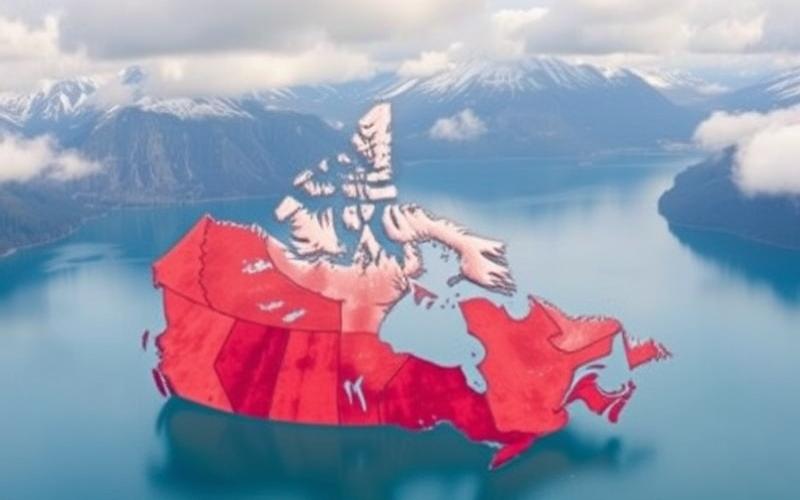
 Published on and written by Cyril Jarnias
Published on and written by Cyril Jarnias
Canada is a top destination for many foreign investors looking to purchase real estate. With its dynamic market, economic stability, and enviable quality of life, the country is attracting more and more international buyers. However, the real estate purchasing process for foreigners in Canada has certain particularities that are essential to know before embarking on such a project. In this article, we will explore in detail the various steps and considerations to keep in mind to realize your dream of property acquisition in Canada.
The Doors of the Canadian Real Estate Market Open to Foreigners
Good news for foreign investors: Canada allows the purchase of real estate by non-residents in most provinces. Unlike some countries that impose strict restrictions on foreign buyers, Canada offers relative openness in this regard. However, it’s important to note that some provinces have implemented specific regulations to govern these acquisitions.
For example, in British Columbia and Ontario, additional taxes are applied to foreign buyers in certain metropolitan areas to regulate the local real estate market. These measures aim to preserve housing affordability for Canadian residents while allowing foreign investors to participate in the market.
It’s also important to mention that since January 1, 2023, the Canadian federal government has implemented a temporary two-year ban on the purchase of residential properties by non-Canadians. This measure aims to ease pressure on the real estate market and promote homeownership for Canadians. However, this ban includes several exceptions, particularly for permanent residents, international students, and temporary workers who meet certain conditions.
Despite these regulations, Canada remains generally open to foreign investors in the real estate sector, offering numerous acquisition opportunities in various regions of the country.
Good to know:
Before embarking on a real estate purchase project in Canada, it is highly recommended to consult with a lawyer specializing in real estate law who can inform you of the latest regulations in force and guide you throughout the process.
Taxation is a crucial aspect to consider when purchasing real estate in Canada as a foreigner. The Canadian tax system has several particularities that can significantly impact your investment.
Foreign Buyer Tax: As mentioned earlier, some provinces like British Columbia and Ontario have implemented a specific tax for foreign buyers. This tax can amount to up to 20% of the property value in certain regions, representing a significant additional cost to factor into your budget.
Rental Income Tax: If you plan to rent out your property, be aware that rental income will be subject to income tax in Canada. As a non-resident, you will be taxed at a flat rate of 25% on your gross income, unless you choose to file a Canadian tax return to be taxed on your net income.
Capital Gains Tax: If you sell your property, you will be subject to capital gains tax in Canada. The tax rate will depend on your tax status and the amount of capital gain realized.
Withholding Tax: When selling real estate by a non-resident, a withholding tax of 25% of the sale price is typically applied. This withholding can be reduced if you obtain a certificate of compliance from the Canada Revenue Agency.
Tax Treaty: It’s important to check if there is a tax treaty between your country of residence and Canada. These treaties can help you avoid double taxation and benefit from certain tax advantages.
Good to know:
Real estate taxation for foreigners in Canada can be complex. It is highly recommended to consult an accountant or tax specialist experienced in international transactions to optimize your tax situation and ensure compliance with all legal obligations.
The Winning File: Essential Documents to Finalize Your Purchase
To successfully complete your real estate purchase project in Canada as a foreigner, you will need to gather a number of essential documents. Here is a list of the main required documents:
- Valid passport: A copy of your current passport will be required to prove your identity.
- Proof of funds: You will need to provide bank statements or other financial documents proving you have the necessary funds for the purchase.
- Credit history: Although you don’t have a credit history in Canada, it may be helpful to provide a credit report from your home country.
- Employment letter and pay stubs: These documents will help justify your income and financial stability.
- Tax identification number: You will need to obtain a Canadian tax identification number, even if you are not a resident.
- Declaration of intended use of the property: A document indicating whether you plan to use the property as a primary residence, secondary residence, or as a rental investment.
- Power of attorney (if necessary): If you cannot be present for certain steps of the transaction, a power of attorney may be required.
In addition to these documents, you will also need to provide specific information related to the real estate transaction, such as the accepted purchase offer, property inspection report, and property appraisal.
It’s important to note that documentary requirements may vary by province and the specific nature of your transaction. Your real estate agent and lawyer can guide you on the exact documents to provide in your particular situation.
Good to know:
Prepare your documents well in advance and ensure they are translated into English or French by a certified translator if necessary. This will help you avoid delays in the purchasing process.
Key Steps to Realize Your Canadian Real Estate Dream
The real estate purchasing process in Canada for foreigners involves several crucial steps. Here’s an overview of the main steps to follow:
1. Property search and selection: Start by identifying the region where you want to invest and search for properties matching your criteria. A local real estate agent can be very helpful at this stage.
2. Obtaining financing: If you need a mortgage, be aware that conditions for foreign buyers can be stricter. You will typically need to provide a larger down payment (often 35% or more) and interest rates may be higher.
3. Submitting a purchase offer: Once you’ve found the right property, your real estate agent will help you formulate a purchase offer. This can be conditional on certain elements such as obtaining financing or a satisfactory property inspection.
4. Due diligence: This step includes property inspection, title verification, and review of all relevant documents related to the property.
5. Finalizing financing: If your offer is accepted, you’ll need to finalize your financing with your lender.
6. Closing the transaction: This final step involves signing all legal documents and transferring funds. A lawyer or notary (in Quebec) will oversee this step to ensure everything is in order.
Throughout this process, it’s crucial to work with professionals experienced in international transactions, including a real estate agent, lawyer, and accountant.
Good to know:
The purchasing process can take several weeks, or even months. Allow enough time and be patient, especially if you’re managing the process remotely.
Expert Tips for a Successful Real Estate Investment in Canada
To maximize your chances of success in your Canadian real estate purchase project, here are some expert tips to keep in mind:
1. Do your research: Familiarize yourself with the Canadian real estate market and the specifics of the region where you want to invest. Each province, and even each city, can have its own market dynamics.
2. Build a team of professionals: Surround yourself with local experts, including a real estate agent, lawyer, and accountant specializing in international transactions.
3. Plan your visit: If possible, plan a trip to Canada to visit properties in person and meet your team of professionals.
4. Understand tax implications: Make sure you fully understand all tax implications of your purchase, both in your country of residence and in Canada.
5. Consider hidden costs: Don’t forget to account for all costs associated with the purchase, including notary fees, taxes, insurance costs, etc.
6. Think long-term: Consider your long-term strategy. Will you use the property as a secondary residence, rent it out, or sell it eventually?
7. Stay informed about regulatory changes: Laws and regulations regarding real estate purchases by foreigners can change. Stay informed about potential changes that could affect your investment.
By following these tips and surrounding yourself with the right professionals, you will significantly increase your chances of making a successful real estate investment in Canada.
Good to know:
Don’t hesitate to ask for references and verify the credentials of the professionals you work with. A trusted and experienced team can make all the difference in the success of your project.
In conclusion, purchasing real estate in Canada as a foreigner is a process that requires careful preparation and a good understanding of local regulations. Although the process may seem complex, with the right information and proper support, it is entirely possible to realize your Canadian real estate dream. Canada offers many attractive opportunities for foreign investors, whether for a secondary residence, rental investment, or future primary residence.
Disclaimer: The information provided on this website is for informational purposes only and does not constitute financial, legal, or professional advice. We encourage you to consult qualified experts before making any investment, real estate, or expatriation decisions. Although we strive to maintain up-to-date and accurate information, we do not guarantee the completeness, accuracy, or timeliness of the proposed content. As investment and expatriation involve risks, we disclaim any liability for potential losses or damages arising from the use of this site. Your use of this site confirms your acceptance of these terms and your understanding of the associated risks.



















